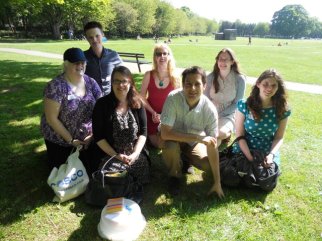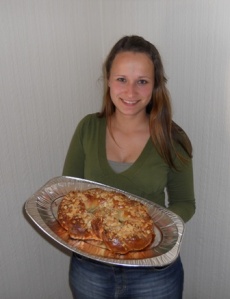On Saturday, May 26, I participated in the Library Camp Leeds, which took a place in Horsforth, a town lying to the north west of Leeds. This was a mini library camp where nearly 50 librarians and shambrarians met and did a lot of networking and experience exchange. We had a lot of cakes & other snacks, as well as frozen juice bars which was a really nice and colourful surprise!
The first part of the library camp we spent in the Horsforth Library. After the lunch break we moved to a nearby park. The weather was perfect for hanging out! I pitched one of the 16 discussions called the New Professionals’ movement in Latvia. Luckily my session was held in the park, where the acoustics was much better than in the Horsforth ballroom.
We ended the day at the Sandbar, where I was officially introduced to librarians’ favourite drink – gin & tonic. Am I officially a ginformation professional now? 😀
New Professionals’ movement in Latvia
Higher education system in Latvia
Latvia is a small country with an area of 25 000 square miles and a population of 2 million people. According to statistical data of 2010, the number of libraries in Latvia is 1831 of which 829 are public libraries and 910 are libraries of general education and vocational education establishments. There are 3447 library professionals of which a tiny minority are new professionals.
In Latvia there is only one university that teaches academic librarianship qualifications (undergraduate and postgraduate studies) and one college that teaches professional librarianship qualifications. Both institutions are located in Riga, the capital city of Latvia.
In higher education programmes the state covers tuition fees for a certain number of students’ places, according to the State Procurement in the respective academic year. Each higher education institution may set a tuition fee for the rest of students’ places. All students are entitled to a state credit for their studies in any higher education programme.
VIAA State Education Development Agency
Every year there are 55 places available for LIS undergraduates, of whom 25 are exempted of tuition fees, and 30 places for LIS postgraduates, of whom 10 can study for free. As a result only few students pay for their studies, while the rest enjoy their free education. Need to mention that tuition fees both for Bachelor, and Master programme studies are about £680 per semester. It is more than obvious why the number of enrolled students is a little above 25 for undergraduates and 10 for postgraduates. Quite worrying is the fact that it is more likely that undergraduates do not tie their future with librarianship.
There is an information management undergraduate degree, which a lot of people take – but then don’t go on to become librarians. So they have a retention issue which we don’t have so much here [in the UK], and not enough young people in the workforce.
Ned Potter, Library adventures in Latvia!
In 2008, of the 25 graduates only 8 went on to work in libraries. And this situation repeats every year. A different situation is with postgraduate studies, which are chosen by new professionals who work in libraries and also by established professionals who work in the library field more than 6 years. Usually there are 10 to 12 students who graduate this programme. In my course we were 5 new professionals, 5 established professionals and 2 professionals from another field.
The question is, what can be done to attract more graduates to the profession? How to raise the profile of librarianship?
New professionals in Latvia
It seems that in 2008/2009 a great shift of new professionalism happened and both formal and informal new professionals’ movements started all over the world and also in Latvia. In 2009, the New Professionals Section of the Library Association of Latvia was founded by 6 LIS students, and I, chair of the section, was one of the co-founders. Now the section has 15 members – both students, and new graduates.
Up-to-date knowledge, enthusiasm, flexibility, openness, understanding user perspective, people skills, and user centered – these are the main strength of new professionals that were indicated during the IFLA New Professionals Special Interest Group (NPSIG) workshop at BOBCATSSS 2012 in Amsterdam, the Netherlands. Everyone who is interested can join this international special interest group for new professionals. In 2010, after the participation at the World Library and Information Congress in Gothenburg, Sweden, also Latvian new professionals engaged in a number of NPSIG activities, for example, providing a helpful hand in organizing IFLA satellite conferences or taking a part in running a number of joint workshops.
This milestone gave us the first spark and motivation to take our group to the next level – we decided to go social and started to blog, tweet, and share information on Facebook, SlideShare, Prezi, and Flickr, while for inner communication a Google Groups mailing list, wiki, and discussion group on Facebook is used. Even though we are new to the profession, we fundraise, network, and, after three years of warming-up, we organize our first on-site conference 4CanGurus, within which 40 new professionals will gain practical experience on innovations, information technologies, user-oriented libraries, and public relations. I see this as a great chance for a real-life networking and communication. The new professionals conference is one of the stages of a larger collaboration project of Latvian, Norwegian, German and Finnish new professionals to be implemented with a support of the Nordic-Baltic Mobility Programme for Culture.
I believe that thanks to our annual projects such as April Fool’s Day, a competition for jokes from libraries, we are noticed by our colleagues. Lately we started to involve Latvian established professionals also in several international projects such as Library Day in the Life, This is What a Librarian Looks Like, and Cycling for Libraries. Once a year in co-operation with the Department of Information and Library Studies we make a presentation to the first year undergraduates, go into schools and organize a students’ and new professionals participation in the annual symposium BOBCATSSS.
If you have heard about the international unconference Cycling for Libraries, you should also know about the Nordea Riga Marathon, within which every year a group of library lovers run for their libraries. 🙂 This is organized by the public library development project Father’s Third Son.
International experience exchange
We have a lot to learn from other new professionals’ movements. And this is exactly what I am doing here, in the UK. In fact, the idea of organizing our own new professionals conference came after I participated in the New Professionals Conference 2011 and Library Camp UK 2011. Furthermore, I love the idea of LISNPN, and would like to introduce something similar also for Latvian new professionals. This is going to be a great challenge for us – to reach out our new professionals. Also the New Professionals Day 2012 has given me some great ideas. And I will definitely think of career talks suggested by Carly.
There are two more great reports on this topic from Penny and Lesley you can learn from. Please let me know of any questions or suggestions you may have.
Once again I need to admit that inspiration and networking is a powerful tool! And we all are amazing!!!






